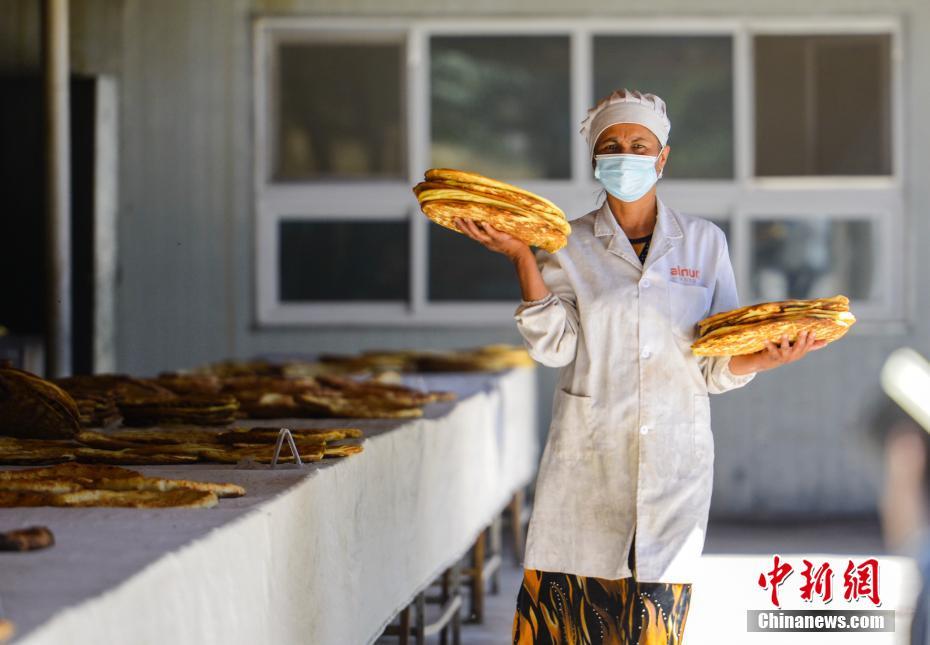Aksu, Hotan in NW China’s Xinjiang shift into the development fast lane
Sitting on the edge of the Taklimakan Desert, the largest desert in China, Aksu and Hotan prefectures in northwest China's Xinjiang Uygur Autonomous Region have experienced robust development in the areas of eco-tourism, industry and education in recent years, becoming “shining pearls” in the region.

A local villager shows Nang, a kind of crusty flatbread popular among local people, in a Nang industrial park in Keping County, Asku prefecture in Xinjiang Uygur Autonomous Region on June 17, 2020. (Photo/Chinanews.com)
Tacun village in Aksu, which boasts a sound ecological environment and beautiful scenery, such as snowy mountains, grasslands and Karst landforms, was once an impoverished village due to its disadvantaged geographic location. In a mere two year period, however, it has been transformed into a well-known village in south Xinjiang with the investments made by the Aksu Culture Tourism Group. The group fully tapped the eco-tourism potential of the village and invested over 200 million yuan (about $31.29 million) to build a scenic spot, according to Turghun Rozi, head of the team responsible for a pairing-up aid program initiated by the group that was directed at Tacun. The scenic spot, which offers up several tourism programs, such as a ski resort, suspension bridge, and sites for tourists to appreciate the starry night sky, provides plenty of job opportunities for local villagers who previously made a living through herding.
A local villager by the name of Gulnar, for example, has been engaged in the tourism sector for two years since she graduated from high school. She guides tourists to ride her horses at the scenic spot every day, earning 5,000 yuan per month during the peak tourism season. “I didn’t expect to make a lot of money from my horses,” she said.
Likewise, Haneriq Town in Hotan invested about 70 million yuan in a cultural and tourism program that integrates features of Uygur culture with 20,000 mu (about 1,333 hectares) of paddy fields in the desert, helping local residents to increase their incomes. Villager Gheyret Rozimemet and his wife earn a rental income every month, receiving monthly earnings of over 6,000 yuan by working for a homestay owner where they also take up regular work.
Meanwhile, a wide variety of industries are now thriving in Hotan and Aksu prefectures. One vivid example is a modern agricultural industrial park in Hotan that integrates agriculture and tourism sectors. With an investment of 1 billion yuan from the Xinjiang Kolengreen Agricultural Technology Development (Group) Co., Ltd., the industrial park is the largest of its kind in Xinjiang. According to the company’s president, Du Jun, the industrial park covers an area of 2,100 mu, as well as possessing a series of processing plants for grain and flour, animal feed, poultry and meat products, in addition to an industry processing area for agricultural sideline products. It has been estimated that the mega project will generate a sales revenue of 3.5 billion yuan and provide some 2,200 job opportunities for local villagers each and every year upon completion, he added.
In June 2020, Aksu also built an industrial park featuring production facilities for Nang, a kind of crusty flatbread popular among local people. It has over 600 ovens and provides the means for about 3,000 bakers to produce Nang at the same time. Statistics have revealed that the industrial park is capable of producing an average of 1.01 million Nang per day, generating an annual sales revenue of 920 million yuan and creating job opportunities for over 6,800 people.
The two prefectures also attach a great importance to education, providing free education from kindergarten to senior high school. With the support of pairing-up assistance from Beijing, Kumu village in Hotan city built a kindergarten with a capacity of 300 students in 2017. Now all the preschoolers in the village are enrolled in a kindergarten class.
The city has implemented plans to build four educational parks, with two of them already being put into use, according to Zhai Qiyong, secretary of the leading Party members’ group of the education bureau of Hotan city.
Photos
Related Stories
- Xinjiang residents tell stories of regional development, prosperity
- Embassy Spokesperson's Remarks on The Times' Article Which Slanders Xinjiang
- Industrial park in Xinjiang's Kashgar provides jobs for local residents
- Xinjiang experts, scholars reject "forced labor" lies
- Magnificent Xinjiang: snow-covered grassland forms an enchanting sight
- Mechanical cotton picking brings more efficiency, income for cotton farmer in Xinjiang
Copyright © 2021 People's Daily Online. All Rights Reserved.










